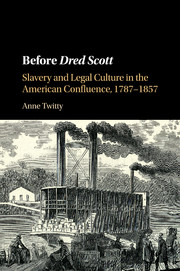Crossref Citations
This Book has been
cited by the following publications. This list is generated based on data provided by Crossref.
Thompson, Lauren Macivor
2018.
“The Reasonable (Wo)man”: Physicians, Freedom of Contract, and Women's Rights, 1870–1930.
Law and History Review,
Vol. 36,
Issue. 4,
p.
771.
Katz, Steven T.
2019.
The Holocaust and New World Slavery.
Milewski, Melissa
2019.
Reframing Black Southerners’ Experiences in the Courts, 1865–1950.
Law & Social Inquiry,
Vol. 44,
Issue. 4,
p.
1113.
Perrone, Giuliana
2019.
“Back into the Days of Slavery”: Freedom, Citizenship, and the Black Family in the Reconstruction-Era Courtroom.
Law and History Review,
Vol. 37,
Issue. 1,
p.
125.
Welch, Kimberly
2019.
William Johnson's Hypothesis: A Free Black Man and the Problem of Legal Knowledge in the Antebellum United States South.
Law and History Review,
Vol. 37,
Issue. 1,
p.
89.
2019.
Missouri.
p.
109.
Edwards, Laura F.
2020.
Response to Rebecca Scott's “Discerning a Dignitary Offense”.
Law and History Review,
Vol. 38,
Issue. 3,
p.
571.
White, Joshua M.
2023.
Slavery, Freedom Suits, and Legal Praxis in the Ottoman Empire, ca. 1590–1710.
Comparative Studies in Society and History,
Vol. 65,
Issue. 3,
p.
526.



